Ashley Cole: Jermaine Jenas on why ‘misunderstood’ left-back was wrongly vilified
- Published

Write down your all-time Premier League team and left-back is probably one of the easiest spots to fill. It is for me.
Ashley Cole was the best in the country in his position for more than 10 years with Arsenal and Chelsea. He is a legend and it is nice to see him back in England to bring down the curtain on his career after more than four years away.
I've no doubt that the player and person I know will make a positive impact as he tries to help Derby County get promoted, even at the age of 38.
But I am sad to say I don't know whether he will finally get the public reception he deserves in the twilight of what has been an extraordinary career for club and country.
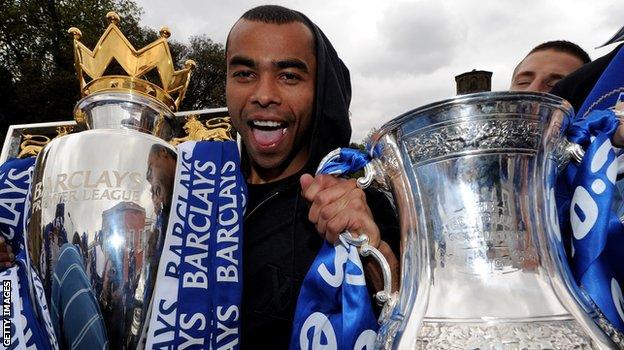
Ashley Cole celebrates winning the Double with Chelsea in 2010. With Arsenal and then across London at Stamford Bridge, he won three Premier League titles, including Arsenal's 'Invincibles' season of 2003-04, seven FA Cups and one League Cup - plus the 2012 Champions League and the 2013 Europa League.
Before he left for spells in Italy and the United States in 2014, there were times when he was seen as public enemy number one and vilified by the media here.
I know what he is really like, what he went through - and how he used it to spur him on.
'I used to plead with him to do a newspaper interview'
When I played for England, between 2003 and 2009, Ash and I were inseparable. When we were away on international duty, I would hang around with him every hour of the day.
We were mates and, whether we were playing computer games or going to the training pitch, we did it together.
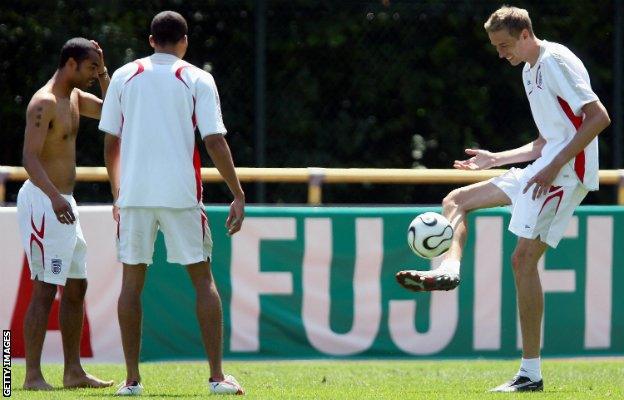
Ashley Cole and Jermaine Jenas play keepie-uppies with Peter Crouch while on England duty at the 2006 World Cup
For a lot of that time, Ash was getting a lot of stick in the newspapers - with headlines about him being greedy, a love rat or a snake.
He was one of the most famous people in the country because of his relationship with Cheryl, and there did not seem to be any boundaries in the treatment he was given - he was held up as a hate figure.
But if you look back at how he played during those periods, he could not be faulted. He went out on the pitch and delivered every time for club and country.
That tells you how strong he is mentally, but there is also no doubt that he is massively misunderstood because the person portrayed in the press is nothing like the one I know.
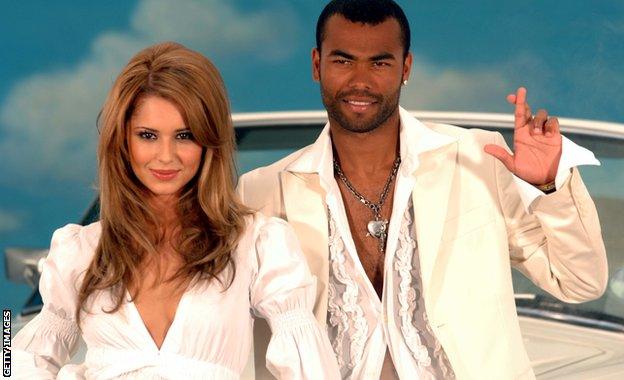
Ashley Cole and Cheryl took part in an advertising campaign for the National Lottery in July 2006, before their wedding that month
Yes, on the pitch, he was horrible. Even when we were close, I would say he was one of the worst opponents I ever faced because he would kick you at every opportunity. That was part of what made him the player he was.
Off it, though, he was completely different.
I used to gauge what a lot of footballers I knew were like by how they behaved around the friends who I grew up with. They would always tell me what they thought and, with Ash, they loved him because he was so down to earth.
I used to almost plead with him to do a newspaper interview, or even a TV reality show, because people needed to know what he was actually like.
I would tell him that people don't know who you are, and you are hated because of it, but he would just say: 'I don't care.'
It's been about a decade since I knew Ash as well as I did when we were team-mates, but I still don't think he cares about the way he is perceived.
Obviously it would be easier to be liked, but not if it goes against his belief the media have treated him badly for so long, so why should he suddenly be friendly to them?
'Social media makes Sterling more powerful than any journalist'
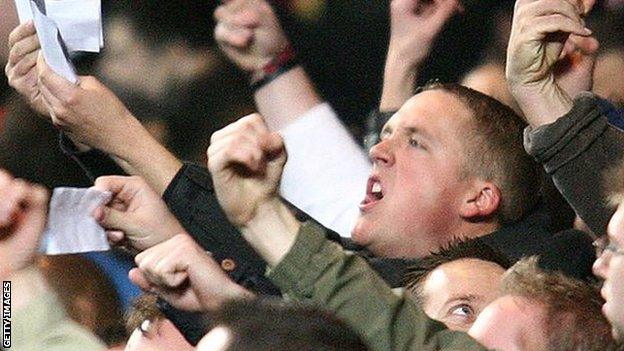
Arsenal fans vent their fury towards Ashley Cole during a game against Chelsea in December 2006, three months after he moved to Stamford Bridge in exchange for £5m and William Gallas. The fans waved fake £20 notes with Cole's face on them at him.
I think a lot of the negativity towards Ash started when the 'Cashley Cole' story came out, about his reaction to a contract offer by Arsenal.
Apparently he was being greedy, when I would argue the reality was he just wanted what he was worth.
By then, in 2006, he was well on the road towards being the best left-back in the world. If something similar were to happen with a top player today, I don't think it would get the same outraged reaction.
I did not see Paul Pogba or Alexis Sanchez getting treated with derision because their wage demands reflected their status when they joined Manchester United and, similarly, I don't think people would flinch now if Ash did the same.
With the outcry over money and his lifestyle, there were lots of similarities with the kind of negative coverage Raheem Sterling has complained about receiving recently, but I don't think racism was the underlying factor in the treatment Ash got.
My argument there would be that Wayne Rooney took a lot of stick too. So did Frank Lampard and, at the start of his career, David Beckham - he may have ended up being the 'golden boy' but he got a lot of heat before that.
I think it boils down to your relationship with the press. I know that if certain players I played with were getting bad coverage, they would have a team around them that would almost massage the journalist or that particular paper's ego to the point where they were onside. The player would do the same, even if he didn't like them.
Ash was never prepared to play that game, though. He just refused to talk.
And I think where Raheem is obviously a lot more powerful now than Ash was then is because he has social media at his fingertips. That makes him more powerful than any journalist in the land.
He can speak directly and instantly to more than five million of his followers on Instagram and Twitter and send a message to the world.
If Ash had had the ability to do that, it might just have dampened down his anger a little bit.
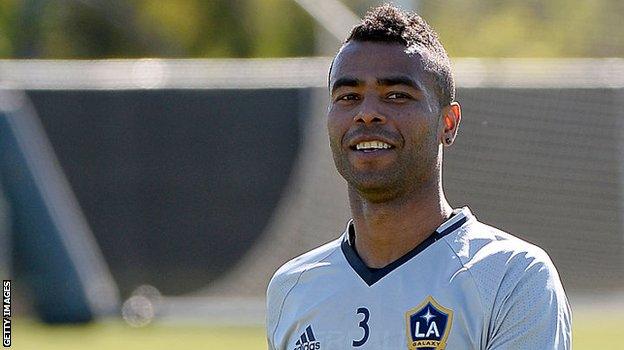
Cole left Chelsea to join Roma in July 2014, and moved to LA Galaxy in January 2016. He was released by the MLS club at the end of their 2018 season and has signed for Derby, managed by his old Chelsea team-mate Frank Lampard. He plans to retire at the end of this season.
'To understand Ash, you have to go back to the start'
If a journalist ever gets the opportunity to sit down properly with Ash, now or when he finishes playing, it would shock people because he is one of the nicest people you could meet.
But I just don't think that is going to happen. He does not bother with the English press any more, because he thinks too much damage has already been done by what they have written about him.
I think to understand not only Ash, but a lot of other footballers and their mindset, you have to go back to where they are from, and any hardship they went through.
He and I are quite similar in that he was also raised by his mum - a single parent - in a tough area. It was a case of 'right mum, it is me and you against everybody else, let's stick together'.
That is what I know I was like, and I think his upbringing definitely shaped his personality and the way he reacted to the criticism he got when he was younger.
I am sure he is a different person now in lots of ways - he has become a father and getting nearer to the end of his career will also have changed his outlook, as it does with any player.
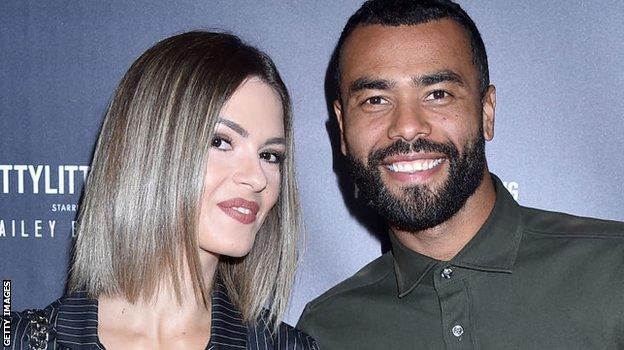
Cole and his partner Sharon Canu have two children together
So I think that he might look back with a bit of regret about some of his behaviour, or what he said at certain times.
Knowing Ash as I do, though, I don't think he will regret too much - purely and simply because he always stands by his decisions, for better or for worse.
'He is at Derby to win promotion, not a popularity contest'
In the end, I came to understand that most of the time Ash was not bothered by his negative treatment because he could live with not being liked, and use it in his favour.
He knew that whatever people said about him, they could never say he wasn't a winner - and he is rightly proud of what he has achieved in the game.
Ash used some of the hate he received from opposing fans as motivation, but when your own fans boo you, like the England fans did for making a mistake against Kazakhstan in 2008, then that hurts.
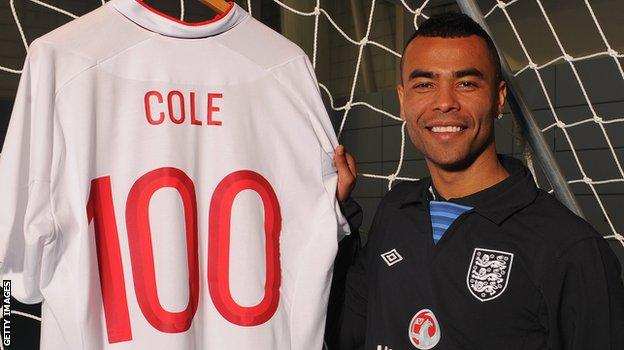
Ashley Cole won his 100th England cap against Brazil in February 2013 - he played for his country a total of 107 times from 2001 to 2014
Playing for England and wearing that shirt meant the world to him, and he had been one of our outstanding players at the 2002 and 2006 World Cup, as well as at the 2004 European Championship. He was so consistent for so long, he deserved far better support.
I was on the bench for that Kazakhstan game and it was almost as if the press coverage had got to our own fans, and even they were giving it to him now. It was another kick in the teeth.
He has had lots of ups and downs over the years but, throughout it all, none of his team-mates have uttered a single bad word about him, which says a lot.
It is not just me who would back him like that - look at Frank Lampard, John Terry or Thierry Henry, who all know him very well.
That's why Lampard has brought him in at Derby. Ash is not the player he was, but he knows how to get things done and get the team over the line.
Even if he is not playing, he will make a huge difference in the Derby dressing room and, essentially, he is another coach and disciple that Frank trusts 100%. It would not surprise me if he ended up being a permanent member of his staff.
And if he does get stick from opposing fans, then of course he will be able to handle it.
He has not gone to Derby to win a popularity contest, he is there to win promotion. This is his last challenge as a player, and I am sure he will be up for it.
Jermaine Jenas was speaking to BBC Sport's Chris Bevan.
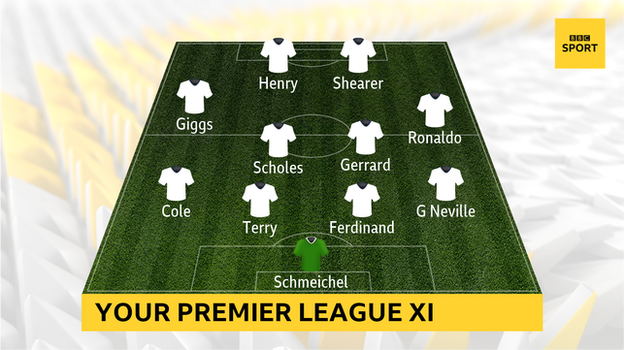
Snapshot of the greatest all-time Premier League XI chosen by BBC Sport users in August 2017 when the competition celebrated its 25th anniversary. Of 379,172 voters, 207,762 chose Ashley Cole at left-back, more than his nearest two challengers - Patrice Evra and Denis Irwin - combined.